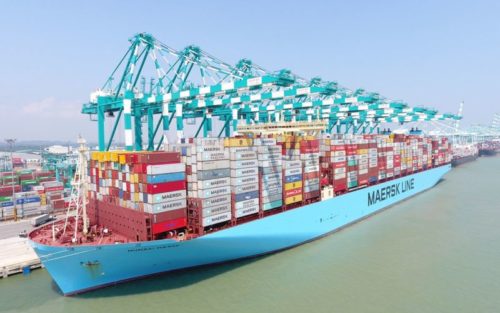
Maersk has signed a deal for the production of IMO 2020-compliant bunker fuel at the Port of Rotterdam that will cover 5-10% of the shipping giant’s annual fuel demand.
The agreement was signed between Maersk Oil Trading and Koole Terminals. Production will take place at the Petrochemical Industrial Distillation (PID) facility, located at Koole’s Botlek site in the heart of the Port of Rotterdam.
Maersk says the The toll distillation deal allows Maersk to produce 0.5% sulphur bunker fuel and will enable Maersk to further expand its bunker supply volumes in Europe.
“The fuel manufacturing process allows Maersk to produce compatible low sulphur fuels that complies with the IMO 2020 sulphur cap implementation, reducing the need to rely on 0.1% price-based gasoil and fuel oil outside the ECA zones,” said Niels Henrik Lindegaard, Head of Maersk Oil Trading at A.P. Moller – Maersk. “Our activities with Koole will be an important driver in ensuring stable, reliable services for Maersk’s customers during a potentially volatile period for global shipping.”
The International Maritime Organization’s global sulphur limit regulations will enter into force January 1, 2020 and require ships around the world to use bunker fuel with a maximum sulphur content of .5%, significantly lower than the current global limit of 3.5%.
Back in February, Maersk secured a deal with New Jersey-based PBF Logistics for the production and storage of .5% sulphur to supply its ships on the U.S. East Coast. Maersk said that deal will amount to approximately 10% of its annual fuel demand starting in 2020.
In August 2018, Maersk announced a leasing agreement with Vopak in the Netherlands for the storage of 2.3 million metric tons 2020-compliant fuel, equivalent of approximately 20% of Maersk’s annual fuel demand, at the Vopak Europoort Terminal in Rotterdam.
Maersk has estimated that the added cost of burning .5% low sulphur fuel will be in the range of $2 billion annually, which it intends to pass to customers in the form of a bunker surcharge.